Die Frau ohne Schatten, Royal Opera | reviews, news & interviews
Die Frau ohne Schatten, Royal Opera
Die Frau ohne Schatten, Royal Opera
Compelling dream-interpretation of Strauss's myth graced by fine singing and conducting
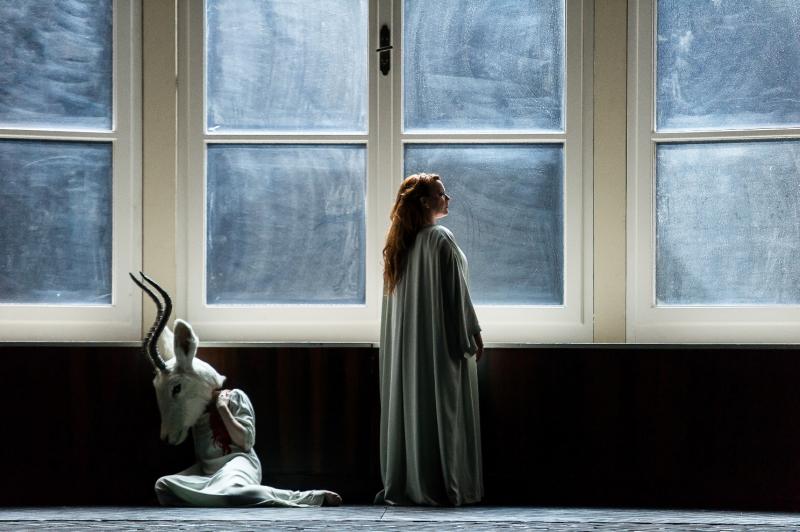
The big message of The Woman Without a Shadow, brushing aside the narrower, moral majority preaching that you’re incomplete without children, seems clear: fulfillment can’t be bought at the cost of another’s suffering. Yet the path towards that realization in this "massive and artificial fairy-tale", as an increasingly alienated Richard Strauss called it, is strewn with magnificent thorns in both his complex, layered music and Hugo von Hofmannsthal’s elaborate symbolic libretto.
Stagings tend to have gone either for a series of pretty, unconnected fairy-tale pictures to throw light and colour around the usually stolid team of heroic singers – as in the Royal Opera’s previous production directed by John Cox but dominated by David Hockney’s hit-and-miss designs, and Jonathan Kent's fizzle-out Mariinsky show – or for pure psychology without the magic context (Christof Loy’s compelling but sometimes too confusing Salzburg Festival production). Claus Guth’s dream-interpretation, arriving at the Royal Opera after a run at Milan's Teatro all Scala, seems to me somewhere convincingly in between. It’s illuminated by strong ideas of its own and is very much of a closely-detailed piece with five superb singers, all of whom hit the ridiculously frequent loud high notes head on, and very impressive, impeccably well-prepared orchestral playing under Semyon Bychkov.
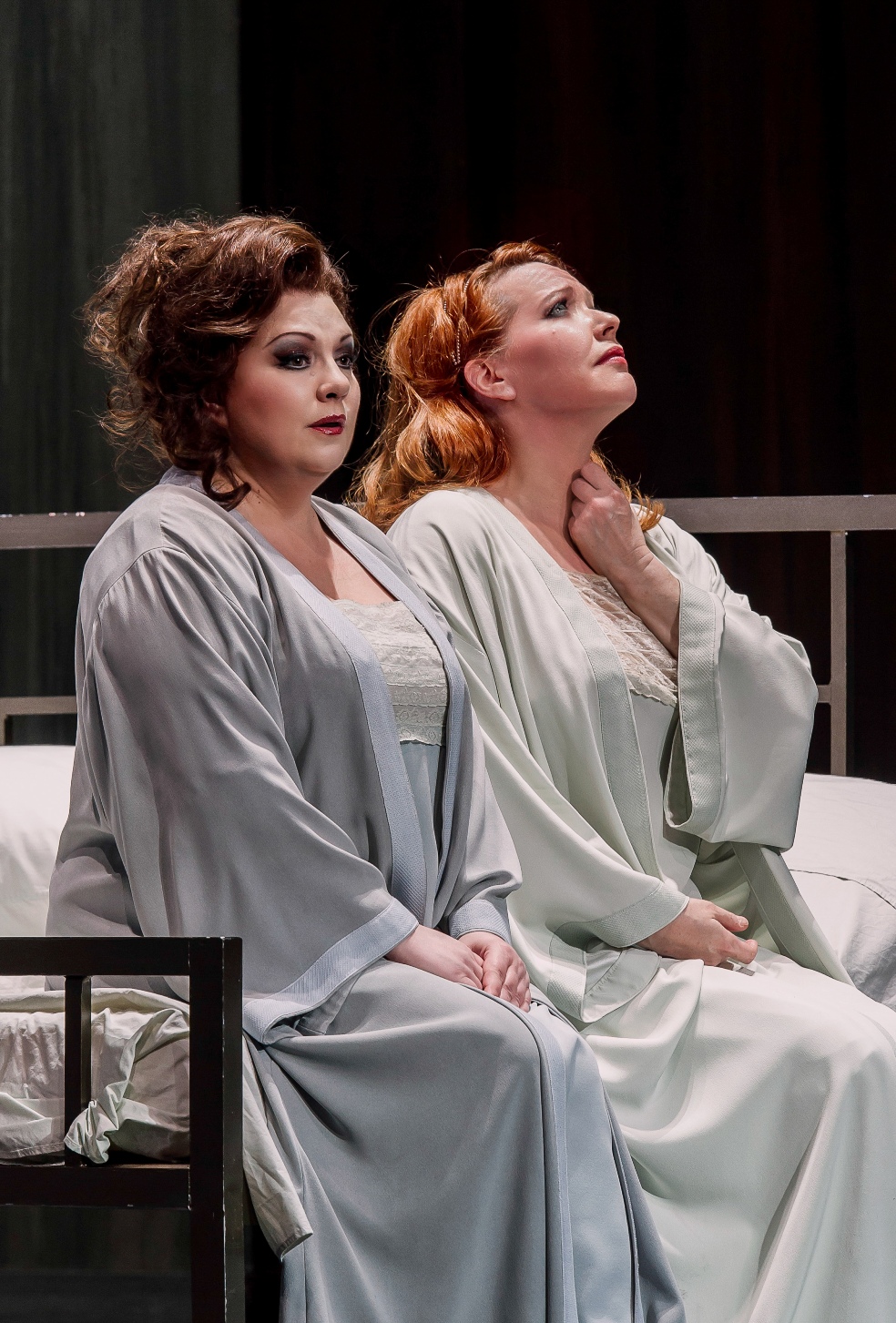 A woman tosses uneasily on a hospital bed in an oppressive wood-panelled room with only one murky window – familiar-looking but impressive designs by Christian Schmidt – attended to by husband, doctor and nurse. She could have had a miscarriage, she may be suffering from mental illness; invent your own back story. What it certainly means is that this is an “it was only a dream” kind of production where anything goes. But that’s fine, given that Guth convincingly follows through the parallel of the heroine’s stuck marriage with the dysfunctional relationship between the mortal wife whose shadow her Mephistophelian Nurse says she must obtain to stop her Emperor turning to stone, and the second woman’s husband, the rather placid, good but ox-like Barak (a butcher rather than a dyer in this production).
A woman tosses uneasily on a hospital bed in an oppressive wood-panelled room with only one murky window – familiar-looking but impressive designs by Christian Schmidt – attended to by husband, doctor and nurse. She could have had a miscarriage, she may be suffering from mental illness; invent your own back story. What it certainly means is that this is an “it was only a dream” kind of production where anything goes. But that’s fine, given that Guth convincingly follows through the parallel of the heroine’s stuck marriage with the dysfunctional relationship between the mortal wife whose shadow her Mephistophelian Nurse says she must obtain to stop her Emperor turning to stone, and the second woman’s husband, the rather placid, good but ox-like Barak (a butcher rather than a dyer in this production).
The other woman, the so-called Dyer’s Wife, is the Empress’s shadow here, or vice-versa, as they act out mirror-image reactions to frustrating spouses (Elena Pankratova and Emily Magee pictured, above right), and it’s to Guth’s credit that he follows through the argument to a final court room “reunion” akin to the nightmarish trial scene in Alice’s Adventures in Wonderland. It's an oddly appropriate denouement when the score – in which Strauss, having begun so brilliantly, seems to have lost faith, waiting on Hofmannsthal for the completion of the libretto during tricky First World War years – is strident and overloaded in its supposed jubilation.
The magic is conveyed from the pit, of course, in the chimerical shape of an incandescent Royal Opera Orchestra, and on stage through three animal-headed figures. Chief is mathe gazelle who, in Pullmanesque terms, is the Empress’s daemon (Hofmannsthal’s idea, that she was shot and captured by the possessive hunter-Emperor). So it makes sense that her father, spirit-world ruler Keikobad, is a stick-propped antelope in frock coat. Most haunting is the falcon which the Emperor used to capture his wife, a bird-headed, winged young woman whose haunting cries punctuate the score. The executors of Keikobad's will are black-winged angels who invade the basement world of Barak's room (pictured below). Andi A. Müller’s video projection does the rest with sperm-like fish, foetuses, even the necessary fire and water in the cataclysmic end of the turbulent Second Act.
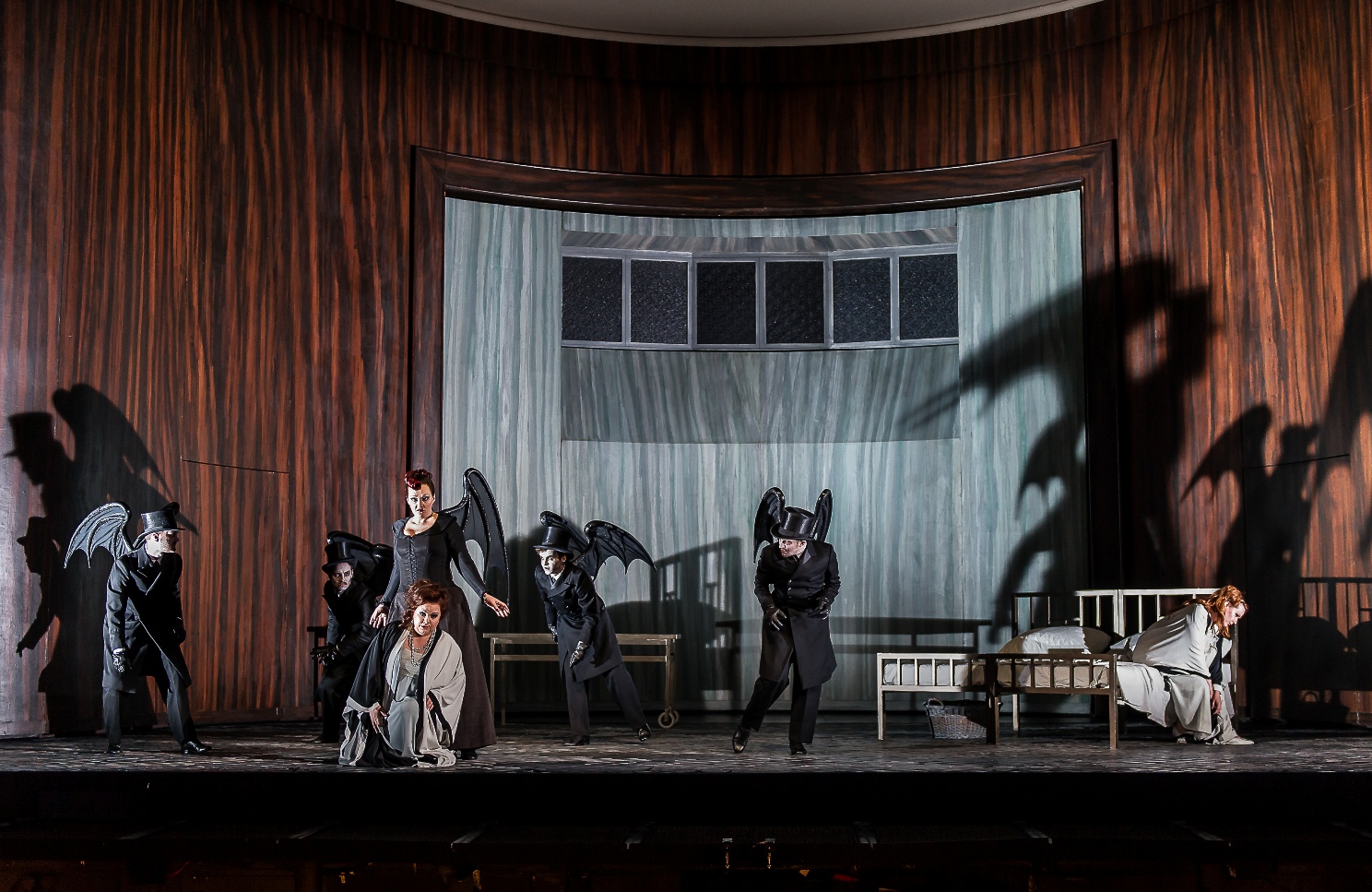
Out of the strong singers playing the two couples only Emily Magee as the Empress, onstage nearly throughout (as was Anne Schwanewilms in Loy's production), is required to act much, which she does with enormous sympathy and a gracious presence. Sinuous, magnificent, even amusing, is that mistress of German speech-melody Michaela Schuster (pictured below) as the Nurse. She looks fabulous, and her low notes are as resplendent as Magee’s tireless upper register.
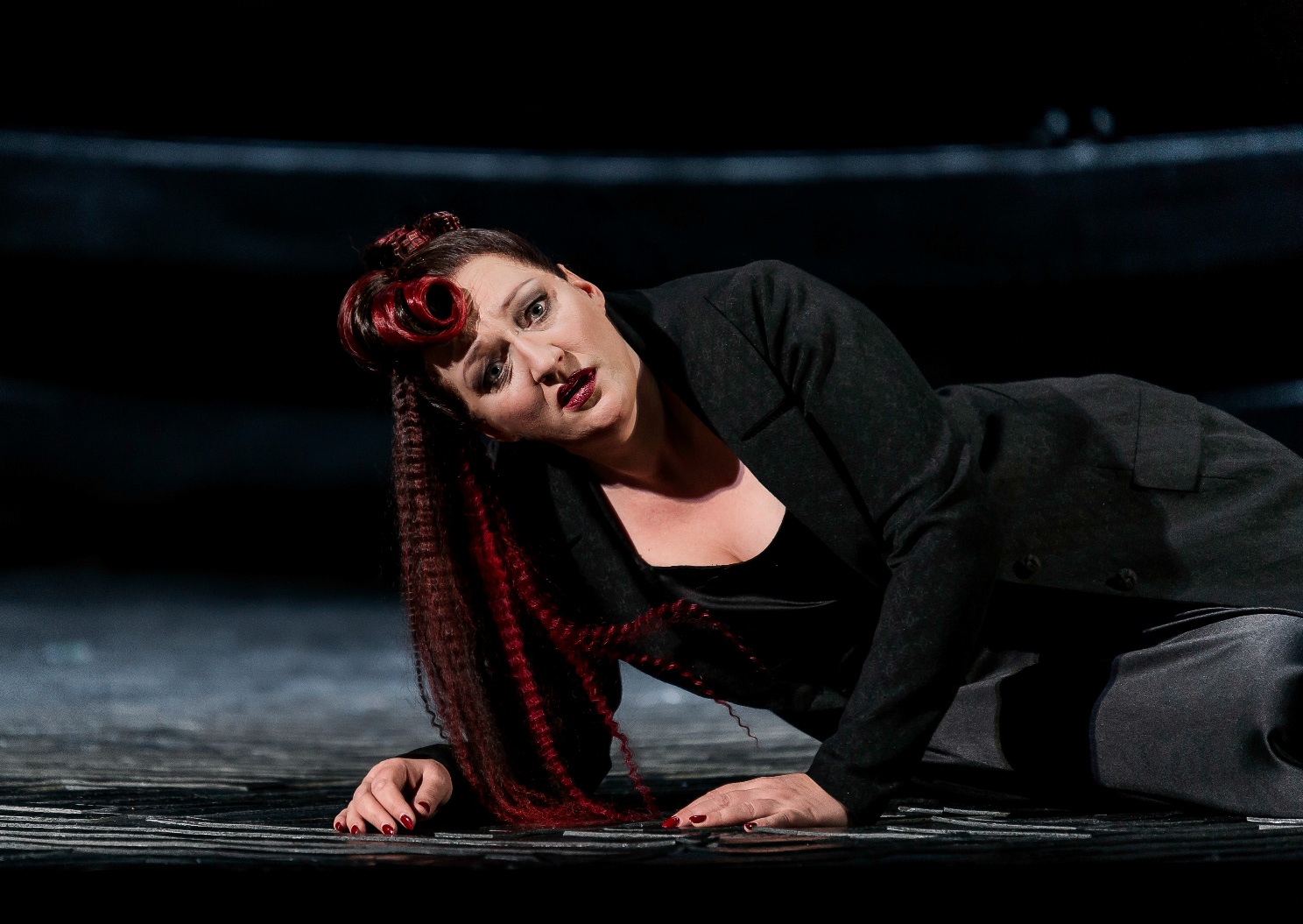 Also hitting the heights are top heroic tenor Johan Botha, who never moves much and doesn’t have to as the stonebound archetypal domineering romantic, and Elena Pankratova, magnificent in the Wife’s big rejection-of-childbearing scene before going on to unfurl ideal long Straussian phrases in a stricken repentance aria and duet at the beginning of Act Three. She can do the quiet, intimate stuff, too: the production's slant towards the women is never clearer than in the significance of her reproach to her husband that he has failed to "win any fruit" from her in two and a half years of marriage.
Also hitting the heights are top heroic tenor Johan Botha, who never moves much and doesn’t have to as the stonebound archetypal domineering romantic, and Elena Pankratova, magnificent in the Wife’s big rejection-of-childbearing scene before going on to unfurl ideal long Straussian phrases in a stricken repentance aria and duet at the beginning of Act Three. She can do the quiet, intimate stuff, too: the production's slant towards the women is never clearer than in the significance of her reproach to her husband that he has failed to "win any fruit" from her in two and a half years of marriage.
Partly because of that take, Johan Reuter’s Barak remains a cipher, if a dependable one. Reuter lacks the nobility of tone which once made Norman Bailey the supreme interpreter of the role and which we might have got from, say, Michael Volle, but comes into his own for the later stages of separation before a reunification of sorts.
Bychkov matches the dream logic of the production with well-balanced textures from ever-clear bass clarinet up to piccolo and harp twitter, big expression in the emotional high points and earthy power. Air isn’t quite his element, but that’s a small price to pay for so assured a view of a monstrously difficult score. Crucial cello and violin solos for Emperor and Empress respectively match the quality of the singing.
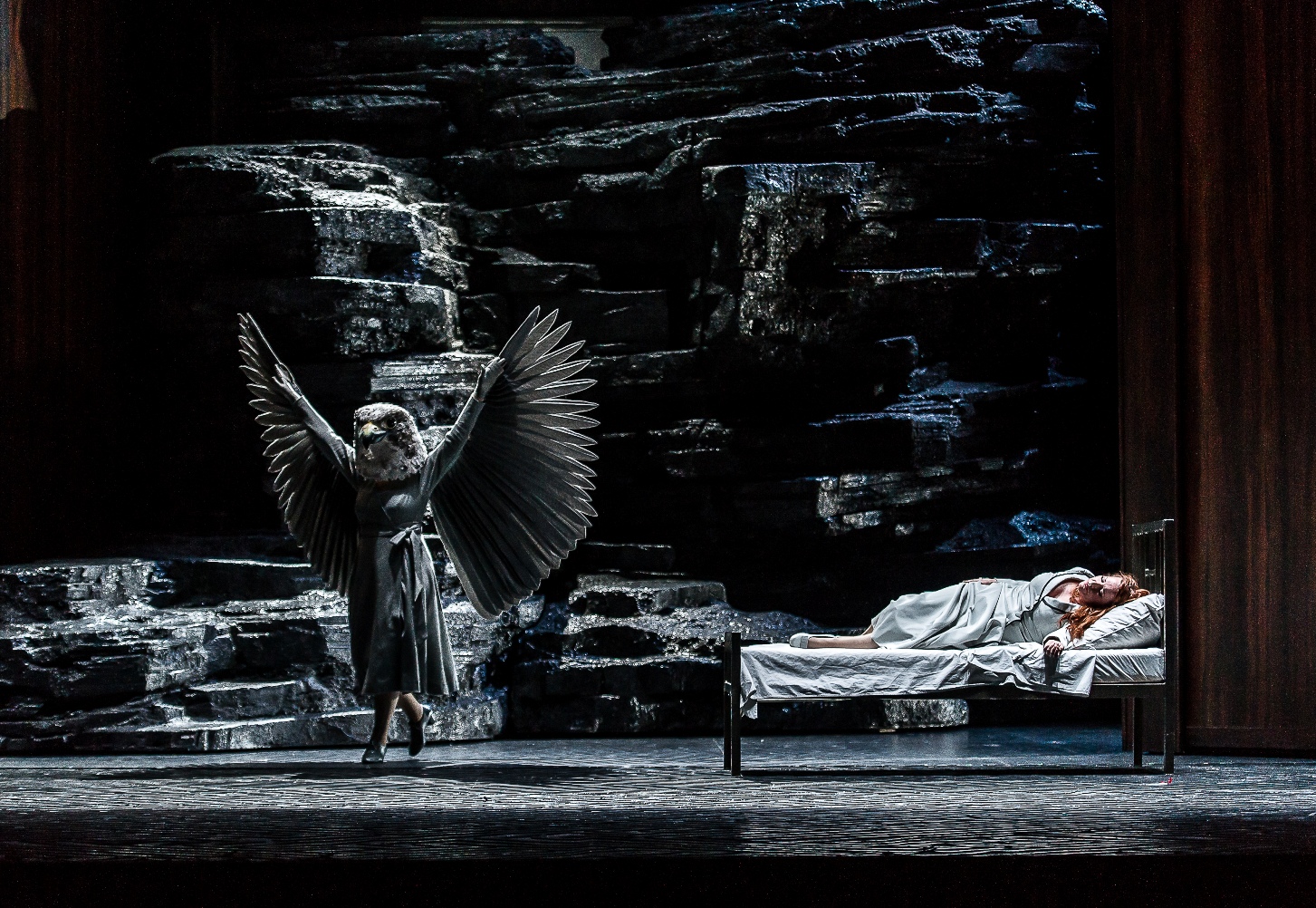 Covent Garden's Jette Parker Young Artists programme has been able to call upon luxurious voices in smaller roles, among them David Butt Philip as the apparitional youth wielded by the Nurse to try and seduce the Dyer's Wife, Anush Hovhannisyan as a plangent Falcon (pictured right with Magee) and Dušica Bijelić as the Keeper of the Threshold urging the Empress to drink the water of life and take the shadow in her ultimate trial. So it’s a real company achievement, already to be notched up as one of the triumphs of a Strauss 150th anniversary year which still needs more surprises beyond the end of a so-far reasonably predictable season.
Covent Garden's Jette Parker Young Artists programme has been able to call upon luxurious voices in smaller roles, among them David Butt Philip as the apparitional youth wielded by the Nurse to try and seduce the Dyer's Wife, Anush Hovhannisyan as a plangent Falcon (pictured right with Magee) and Dušica Bijelić as the Keeper of the Threshold urging the Empress to drink the water of life and take the shadow in her ultimate trial. So it’s a real company achievement, already to be notched up as one of the triumphs of a Strauss 150th anniversary year which still needs more surprises beyond the end of a so-far reasonably predictable season.
MORE RICHARD STRAUSS ON THEARTSDESK
Der Rosenkavalier, Royal Opera (2009). Uneven revival of John Schlesinger’s 25-year-old production
Capriccio, Grange Park Opera (2010). Lively staging, stylish singing and a welcome intrusion of wartime reality
Salome, Royal Opera (2010). Angela Denoke's mercurial Salome (pictured below by Clive Barda) shimmers in Strauss's monstrously beautiful opera
Ariadne auf Naxos, Welsh National Opera (2010). Hoffmansthal's libretto is all about fidelity. This updating is faithful, up to a point
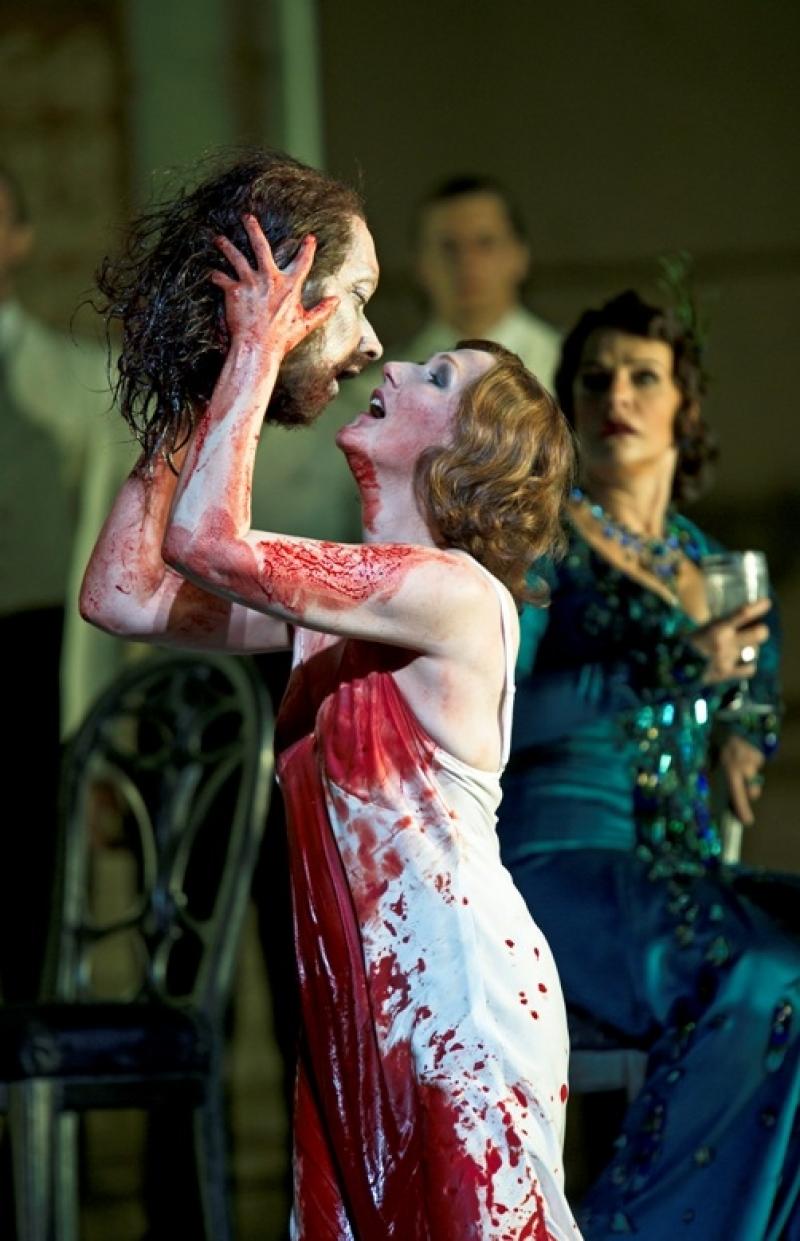 Intermezzo, Scottish Opera (2011). Soprano Anita Bader graces a Klimtian take on Richard Strauss's domestic comedy
Intermezzo, Scottish Opera (2011). Soprano Anita Bader graces a Klimtian take on Richard Strauss's domestic comedy
Die Frau ohne Schatten, Mariinsky Opera (2011). Strauss's massive fairy tale makes a rare outing in Gergiev’s musically strong venture at the Edinburgh Festival
Der Rosenkavalier, English National Opera (2012). David McVicar and Edward Gardner deliver a riveting account of Strauss's popular opera with Amanda Roocroft as the Marschallin
Intermezzo, Buxton Festival (2012). Fine style in Strauss's comedy-with-feeling
Ariadne auf Naxos, Glyndebourne Festival Opera (2013). Strauss's opera reluctantly enters the Battle of Britain courtesy of a young German director
Capriccio, Royal Opera (2013). Renée Fleming leads superlative cast in concert performance of Strauss's operatic debate
Elektra, Royal Opera (2013). Revival with Christine Goerke in the title role hits the horrid heart of the matter in Strauss's poleaxing masterpiece
Der Rosenkavalier, Glyndebourne (2014). Richard Jones finds new order in rococo comedy for music, with Kate Royal as the Marschallin
Salome, BBC Proms (2014). Nina Stemme stuns with Donald Runnicles and the Deutsche Oper Berlin in a giddying account of Strauss's incredible score at the Proms
Ariadne auf Naxos, Royal Opera (2014). Two nymphs are the real revelation in this revival of evergreen hybrid
Salome, Symphony Hall, Birmingham (2015). Lise Lindstrom steals the show from Karabits and Bournemouth SO as a sensual Strauss anti-heroine in concert
Der Rosenkavalier, Royal Opera (2016). Robert Carsen's handsome production with Renée Fleming is elevated by superb orchestral playing
rating
Explore topics
Share this article
The future of Arts Journalism
You can stop theartsdesk.com closing!
We urgently need financing to survive. Our fundraising drive has thus far raised £33,000 but we need to reach £100,000 or we will be forced to close. Please contribute here: https://gofund.me/c3f6033d
And if you can forward this information to anyone who might assist, we’d be grateful.

Subscribe to theartsdesk.com
Thank you for continuing to read our work on theartsdesk.com. For unlimited access to every article in its entirety, including our archive of more than 15,000 pieces, we're asking for £5 per month or £40 per year. We feel it's a very good deal, and hope you do too.
To take a subscription now simply click here.
And if you're looking for that extra gift for a friend or family member, why not treat them to a theartsdesk.com gift subscription?
more Opera
 Help to give theartsdesk a future!
Support our GoFundMe appeal
Help to give theartsdesk a future!
Support our GoFundMe appeal
 Peter Grimes, Welsh National Opera review - febrile energy and rage
In every sense a tour de force
Peter Grimes, Welsh National Opera review - febrile energy and rage
In every sense a tour de force
 Owen Wingrave, RNCM, Manchester review - battle of a pacifist
Orpha Phelan brings on the big guns for Britten’s charge against war
Owen Wingrave, RNCM, Manchester review - battle of a pacifist
Orpha Phelan brings on the big guns for Britten’s charge against war
 Tales of Apollo and Hercules, London Handel Festival review - compelling elements, but a failed experiment
Conceptually the two cantatas just don't work together
Tales of Apollo and Hercules, London Handel Festival review - compelling elements, but a failed experiment
Conceptually the two cantatas just don't work together
 La finta giardiniera, The Mozartists, Cadogan Hall review - blooms in the wild garden
Mozart's rambling early opera can still smell sweet
La finta giardiniera, The Mozartists, Cadogan Hall review - blooms in the wild garden
Mozart's rambling early opera can still smell sweet
 Der fliegende Holländer, Irish National Opera review - sailing to nowhere
Plenty of strong singing and playing, but the staging is static or inept
Der fliegende Holländer, Irish National Opera review - sailing to nowhere
Plenty of strong singing and playing, but the staging is static or inept
 Die Zauberflöte, Royal Academy of Music review - first-rate youth makes for a moving experience
The production takes time to match Mozart's depths, but gets there halfway through
Die Zauberflöte, Royal Academy of Music review - first-rate youth makes for a moving experience
The production takes time to match Mozart's depths, but gets there halfway through
 Mansfield Park, Guildhall School review - fun when frothy, chugging in romantic entanglements
Jonathan Dove’s strip-cartoon Jane Austen works well as a showcase for students
Mansfield Park, Guildhall School review - fun when frothy, chugging in romantic entanglements
Jonathan Dove’s strip-cartoon Jane Austen works well as a showcase for students
 Uprising, Glyndebourne review - didactic community opera superbly performed
Jonathan Dove and April De Angelis go for the obvious, but this is still a rewarding project
Uprising, Glyndebourne review - didactic community opera superbly performed
Jonathan Dove and April De Angelis go for the obvious, but this is still a rewarding project
 Fledermaus, Irish National Opera review - sex, please, we're Viennese/American/Russian/Irish
Vivacious company makes the party buzz, does what it can around it
Fledermaus, Irish National Opera review - sex, please, we're Viennese/American/Russian/Irish
Vivacious company makes the party buzz, does what it can around it
 The Capulets and the Montagues, English Touring Opera review - the wise guys are singing like canaries
There's a bel canto feast when Bellini joins the Mob
The Capulets and the Montagues, English Touring Opera review - the wise guys are singing like canaries
There's a bel canto feast when Bellini joins the Mob
 Mary, Queen of Scots, English National Opera review - heroic effort for an overcooked history lesson
Heidi Stober delivers as beleaguered regent, but Thea Musgrave's opera is limiting
Mary, Queen of Scots, English National Opera review - heroic effort for an overcooked history lesson
Heidi Stober delivers as beleaguered regent, but Thea Musgrave's opera is limiting

Add comment